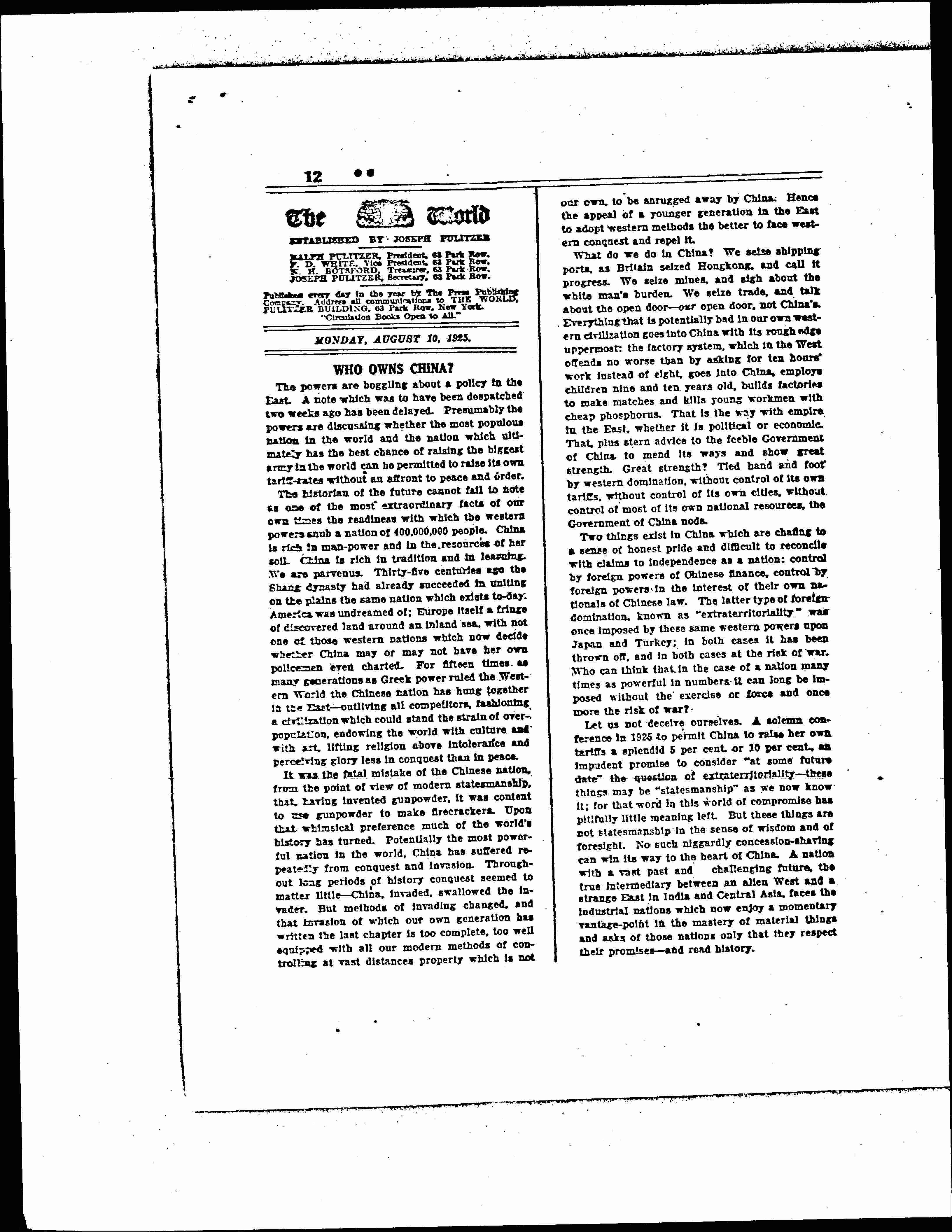WHO OWNS CHINA?
The powers are boggling about a policy in the East. A note which was to have been [dispatched] two weeks ago has been delayed. Presumably the powers are discussing whether the most populous nation in the world and the nation which ultimately has the best chance of raising the biggest army in the world can be permitted to raise its own tariff-rates without an affront to peace and order.
The historian of the future cannot fail to note as one of the most extraordinary facts of our own times the readiness with which the western powers snub a nation of 400,000,000 people. China is rich in man-power and in the resources of her soil. China is rich in tradition and in learning. We are parvenus. Thirty-five centuries ago the Shang dynasty had already succeeded in uniting on the plains the same nation which exists [today]. America was undreamed of; Europe itself a fringe of discovered land around an island sea, with not one of those western nations which now decide whether China may or may not have her own policemen even charted. For fifteen times as many generations as Greek power ruled the Western World the Chinese nation has hung together in the East -- outliving all competitors, fashioning a civilization which could stand the strain of overpopulation, endowing the world with culture and with art, lifting religion above intolerance and perceiving glory less in conquest than in peace.
It was the fatal mistake of the Chinese nation, from the point of view of modern statesmanship, that, having invented gunpowder, it was content to use gunpowder to make firecrackers. Upon that whimsical preference much of the world's history has turned. Potentially the most powerful nation in the world, China has suffered repeatedly from conquest and invasion. Throughout long periods of history conquest seemed to matter little -- China, invaded, changed, and that invasion of which our own generation has written the last chapter is too complete, too well equipped with all our modern methods of controlling at vast distances properly which is not our own, to be shrugged away by China. Hence the appeal of a younger generation in the East to adopt western methods the better to face western conquest and repel it.
What do we do in China? We seize shipping ports, as Britain seized [Hong Kong], and call it progress. We seize mines, and sigh about the white man's burden. We seize trade, and talk about the open door -- our open door, not China's. Everything that is potentially bad in our own western civilization goes into China with its rough edge uppermost: the factory system, which in the West offends no worse than by asking for ten hours' work instead of eight, goes into China, employs children nine and ten years old, builds factories to make matches and kills young workmen with cheap phosphorus. That is the way with empire in the East, whether it is political or economic. That, plus stern advice to the feeble Government of China to mend its ways and show great strength. Great strength? Tied hand and foot by western domination, without control of its own tariffs, without control of its own cities, without control of most of its own national resources, the Government of China nods.
Two things exist in China which are chafing to a sense of honest pride and difficult to reconcile with claims to independence as a nation: control by foreign powers of Chinese finance, control by foreign powers in the interest of their own nationals of Chinese law. The latter type of foreign domination, known as "extraterritoriality" was once imposed by these same western powers upon Japan and Turkey; in both cases it has been thrown off, and in both cases at the risk of war. Who can think that in the case of a nation many times as powerful in numbers it can long be imposed without the exercise or force and once more the risk of war?
Let us not deceive ourselves. A solemn conference in 1925 to permit China to raise her own tariffs a splendid 5 [percent] or 10 [percent], an impudent promise to consider "at some future date" the question of extraterritoriality -- these things may be "statesmanship" as we now know it; for that word in this world of compromise has pitifully little meaning left. But these things are not statesmanship in the sense of wisdom and of foresight. No such niggardly concession-shaving can win its way to the heart of China. A nation with a vast past and challenging future, the true intermediary between an alien West and a strange East in India and Central Asia, faces the industrial nations which now enjoy a momentary vantage-point in the mastery of material things and asks of those nations only that they respect their promises --and read history.




Comments